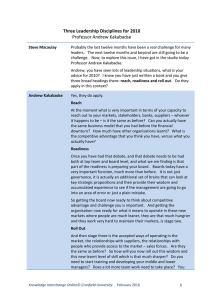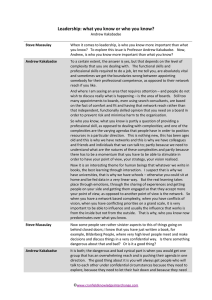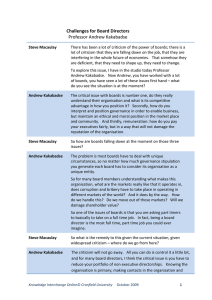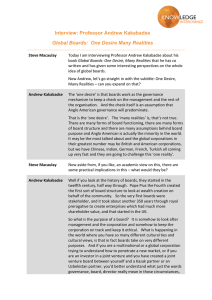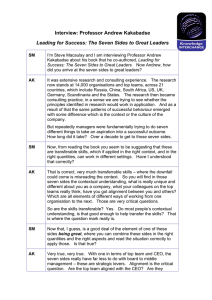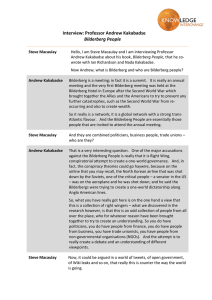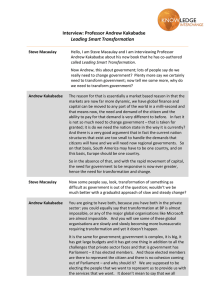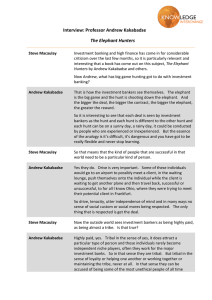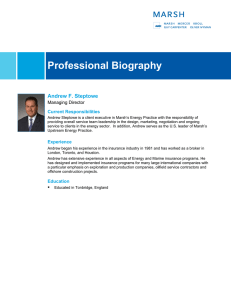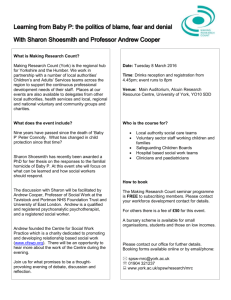Interview: Professor Andrew Kakabadse
advertisement
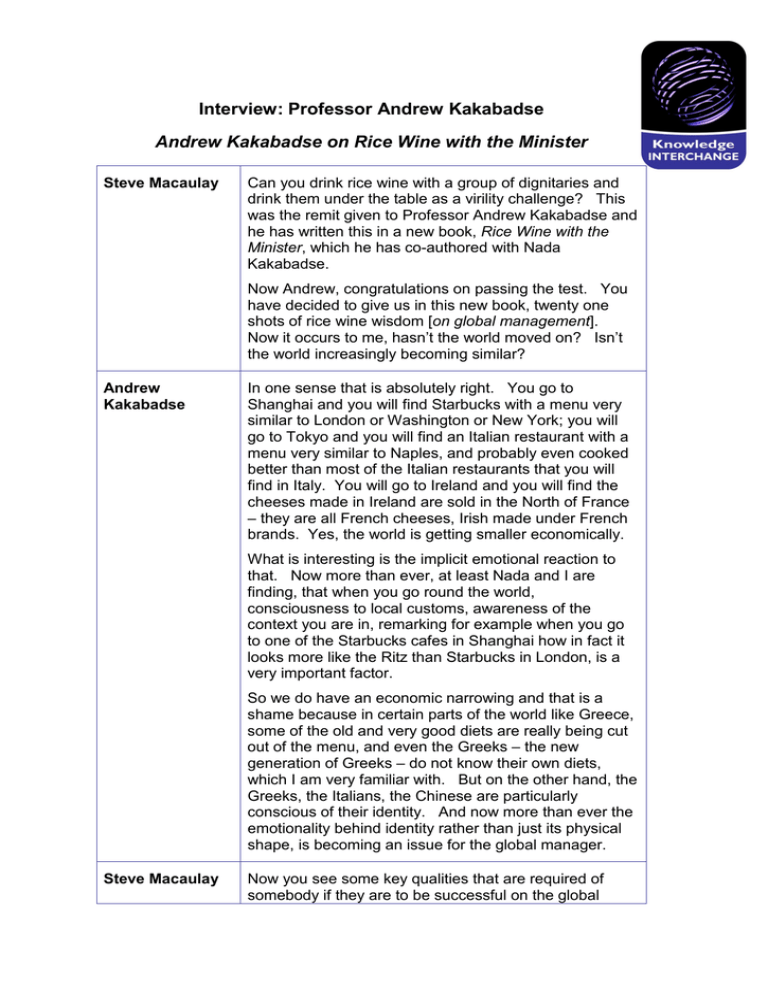
Interview: Professor Andrew Kakabadse Andrew Kakabadse on Rice Wine with the Minister Steve Macaulay Can you drink rice wine with a group of dignitaries and drink them under the table as a virility challenge? This was the remit given to Professor Andrew Kakabadse and he has written this in a new book, Rice Wine with the Minister, which he has co-authored with Nada Kakabadse. Now Andrew, congratulations on passing the test. You have decided to give us in this new book, twenty one shots of rice wine wisdom [on global management]. Now it occurs to me, hasn’t the world moved on? Isn’t the world increasingly becoming similar? Andrew Kakabadse In one sense that is absolutely right. You go to Shanghai and you will find Starbucks with a menu very similar to London or Washington or New York; you will go to Tokyo and you will find an Italian restaurant with a menu very similar to Naples, and probably even cooked better than most of the Italian restaurants that you will find in Italy. You will go to Ireland and you will find the cheeses made in Ireland are sold in the North of France – they are all French cheeses, Irish made under French brands. Yes, the world is getting smaller economically. What is interesting is the implicit emotional reaction to that. Now more than ever, at least Nada and I are finding, that when you go round the world, consciousness to local customs, awareness of the context you are in, remarking for example when you go to one of the Starbucks cafes in Shanghai how in fact it looks more like the Ritz than Starbucks in London, is a very important factor. So we do have an economic narrowing and that is a shame because in certain parts of the world like Greece, some of the old and very good diets are really being cut out of the menu, and even the Greeks – the new generation of Greeks – do not know their own diets, which I am very familiar with. But on the other hand, the Greeks, the Italians, the Chinese are particularly conscious of their identity. And now more than ever the emotionality behind identity rather than just its physical shape, is becoming an issue for the global manager. Steve Macaulay Now you see some key qualities that are required of somebody if they are to be successful on the global Professor Andrew Kakabadse stage; I have noted them down here as reach, readiness and roll out. I wonder if we could explore those? You have grouped the twenty one shots, if you like, of wisdom into those areas. So let’s start with reach; what does that actually mean in practice? Andrew Kakabadse What it means in practice is what is the extent of your reach; how far can you network? These three categories apply to individuals, they apply to teams and they apply to whole corporations. So as a person, do you have the reach to, for example, contact Nelson Mandela in South Africa to discuss the corporate responsibility issues in a pharmaceutical industry and tie that all up with a deal. That is you as a chief executive. Does the corporation have the reach into a supply chain on a responsible basis right across Asia? So the reach bit is the capacity of the organisation to extend into different countries and cultures. The skill of the individual to have developed a network that will allow that. The ability of a team which is multinational and located in different areas to reach out to different parts of the organisation and their own stakeholders and yet still come together and work together as a team that hardly ever meets, but is electronically linked together. Steve Macaulay The second one is readiness; what does that entail? Andrew Kakabadse This is the preparation in terms of organisation and person again. The readiness of the organisation; are you an organisation that is flexible? If you have very hierarchical rigid structures, which certain organisations have and use them very well by the way because one of their competitive advantages is the management of costs - so they need a very disciplined structure. Well at the same time, do you have a capacity to be flexible in x, y and z? At a personal level, do you understand what it means to operate in different cultures? One of the most interesting things for executives today is not just their EQ and their team skills and their skills of communication, which really are important and have been promoted and talked about over the last decade. We are finding that those are important, but there is something just above them and that is their intellect. And intellect we classify under various headings; the ability to think, the ability to analyse and also the ability to almost soak in knowledge. We are find some of the most gifted CEOs and chairmen and general managers, they read a lot. When they go to Knowledge Interchange Podcast Page 2 Professor Andrew Kakabadse a new area they read about the whole customs and cultures; they are briefed. They try and remember one or two bits of poetry or one or two elements of that culture that will impress people. It could even be language, or how you say hello or how you say goodbye. That is part of the readiness stuff. Do you know how to prepare yourself for entry into a context which could be a supply chain, it could be a ministerial meeting and you have learnt enough to impress. Now, you have to be able to create the time for that. People have busy schedules on a personal level. So part of the readiness thing is the discipline. And it is a discipline to understand what you must do which adds that extra value in terms of your presence, but doesn’t necessarily get you the business deal. It creates the platform for making you look impressive so that the business deal then can be that much easier negotiated. You will find exactly the same issues at the organisational level as well and at the team level. And that is what that whole section talked about. Steve Macaulay Now once you have negotiated the deal you have got this whole area, which is the third ‘r’ which is roll out. What do you see that entails? Andrew Kakabadse Well the roll out part is now you are rolling out all these skills in these different contexts. You have a capacity to call upon stakeholders, you already have governance, for example, at the corporate level that has looked at the responsibilities and how they are exercised in the supply chain. You have a consciousness from board level down in the organisation. There is a stewardship and a discipline there to really understand some of the dilemmas managers face. Many corporations today have that as a serious concern because you may, in terms of your policies, be very responsible in attitude and in intent. But then when it comes to managing costs – which is a major issue today – you will find there could be three to four levels in the structure where the line managers are being pushed so hard on the management of costs, they do not know how to integrate the responsibility requirements because they will in a sense counter your capacity to control costs, it literally involves money, and integrate that in a way that makes sense for that context. Now is that the chief executive’s responsibility? We have come to conclude no, it is actually the chairman and the board’s responsibility to look at those tensions Knowledge Interchange Podcast Page 3 Professor Andrew Kakabadse and provide guidance to the management because at the end of the day the management has to run the business and they have to achieve their financial product pricing targets. So that is what the readiness roll out bit really is all about; when you roll things out. No matter how ready you were and no matter how smart you are, what happens in practice? What are the contingencies you have to deal with? How many of those contingencies can you spot? When it comes to handling the politics of the place, do you know what those are really like? Do you know enough about the personalities? Have you been experienced in handling different personalities? Allowing a conversation to go off beam for a while just to build a relationship at that moment in time, overcome a sensitivity and then bring the conversation back. Steve Macaulay Now lastly Andrew, you have got twenty one pieces of advice, you have distilled them into three areas; how would you suggest that people take on board this wisdom that you have acquired through research, through observation and so on? Andrew Kakabadse If you wanted a very quick glance at the book in the introduction you really have the principles of the three areas and then a very quick overview of each of the shots. So if you wanted to distil it quickly, my advice is read the introduction and read nothing else. What we have tried to do in the book is play less the academic research part and provide more of the stories; the real life experiences, the challenges that people faced, that corporations faced an how in a very real life way, also, they overcame those. So the second thing to do is to look at the stories. But from a life perspective all that the book does is it really tries to make you aware of what it means to operate in different cultures. Going to different place and being polite and being nice is no longer possible. Let me give you a very interesting example, as a chief executive something goes wrong in Asia, you are talking to the Asian team and if you are talking to your American or British team, admitting to a mistake. Coming up and saying we didn’t get it right this time, but we will do better next time. Now, you may go and be exactly the same in intent in Asia, very polite, to find ultimate resistance. If you have not prepared yourself for different cultures, you won’t understand that just admitting to a mistake is actually a Judo Christian principle. It is almost 4,000 Knowledge Interchange Podcast Page 4 Professor Andrew Kakabadse years old. You go to China, there is a 5,000 year old principle which is no shame, no loss of face. It is absolutely impossible to admit to a mistake because what you have done is you have lost face. So for the executive who has not prepared themselves, they have not really thought about the situation, they have not extended a network in such a way that it makes sense for the Asians or the South Africans or whatever, they will go in a very polite way and create an uproar. In China that politeness would be seen as political, manipulative behaviour. And that is something that executive never intended. So if you do go to China and there is a mistake, the first thing you do is you talk about issues with no loss of face; talk about some issue out there, talk about somebody else’s company, talk about how that company faced a problem and then found a way round it. And then with your own team, only talk about ways round it. So nobody looses face, everybody gains face. The implicit message is guys we made a mistake; the explicit behaviour is there isn’t a problem and we are now going to do things better. Steve Macaulay Andrew, thank you very much, that is some very valuable advice. Knowledge Interchange Podcast Page 5
